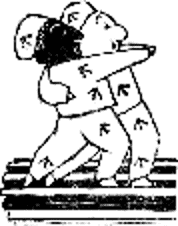Take a look inside James Hardy Vaux’s 1819 Dictionary of Criminal Slang and Other Impolite Terms as Used by the Convicts of the British Colonies of Australia with Additional True Stories, Remarkable Facts and Illustrations.
Take a peek inside this fascinating book.
In the early 1800s magistrates in the Australian colonies were often frustrated by the language used by reoffending convicts to disguise their criminal activities and intensions. Convict clerk James Hardy Vaux came up with a useful idea: a dictionary of slang and other terms used by convicts. And so, in 1812, he compiled what was to be Australia’s first published dictionary.
With words such as fence (a receiver of stolen goods), flesh-bag (a shirt), flip (to shoot); galloot (a soldier), kid (a child thief), knuckle (to pickpocket), ramp (to rob out in the open), ruffles (handcuffs), screw (a skeleton key), serve (to rob) and stamps (shoes).
Vaux’s dictionary is a fascinating account of convict language, including the origins and early usage of several words that have evolved to become part of Australian English today. And Simon Barnard’s illustrations and supporting accounts of individual convicts and their criminal antics complements this lively picture of Australia’s convict history.
TAKE A PEEK INSIDE
 DANCERS: Stairs.
DANCERS: Stairs.
Stairs were called dancers because people ‘danced’ up and down them. For neglect of duty, James Coyle was sentenced to ‘dance on the tread-mill’ – a long rotating cylindrical wheel fitted with steps. Attached to the wheel was a system of gears that turned millstones to grind grain.
Convicts climbed the treadmill as though they were walking up dancers. Slang names for a treadmill included stepper, shin-scraper, cock-chafer, wheel-of-life, roundabout, Jack the slipper, the stairs without a landing, the never-ending staircase, and the Cubit, so named after its inventor, William Cubit.
 ROW IN THE BOAT: To go snacks, or have a share in the benefit arising from any transaction to which you are privy. To let a person row with you, is to admit him to a share.
ROW IN THE BOAT: To go snacks, or have a share in the benefit arising from any transaction to which you are privy. To let a person row with you, is to admit him to a share.
In 1792, a gang of masked burglars clad in black and armed with pistols and cutlasses committed a violent home invasion in Blackwall, England. Police investigating the robbery discovered the missing items in the house of Mary Randall. But she accused her lodger, Elizabeth Payne, of the crime.
According to Randall’s testimony, Payne boasted that she had ‘plenty of plants’ because ‘she knew of a good speak’ and would ‘row in it’. But further investigation revealed Randall was lying. Her brother, a notorious river pirate, was executed for his part in the robbery and she was transported to New South Wales for a 14-year term.
 SALT-BOXES: The condemned cells in Newgate are so called.
SALT-BOXES: The condemned cells in Newgate are so called.
A saltbox is a style of building that is multistorey at the front and single-storey at the back with a steeply pitched roof, named after a type of box with a sloping lid that stored salt. According to author Charles Dickens, the cells at Newgate Prison were arranged ‘one above the other’ in a style similar to a saltbox building.
Michael Connor escaped from Newgate Prison in 1788. When the police caught up with Connor, he was hard at work – he confessed to escaping to support his impoverished family of four. For ‘feloniously returning from transportation and being found at large’, Connor was condemned to death and sent to the salt-boxes, but he received a stay of execution and was transported to New South Wales.
 WRINKLE: To lie, or utter a falsehood.
WRINKLE: To lie, or utter a falsehood.
WRINKLE: An untruth.
WRINKLER: A person prone to lying; such a character is called also a gully, which is probably an abbreviation of Gulliver, and from hence, to gully signifies to lie, or deal in the marvellous.
A lie was called a wrinkle because a liar creases the truth. When convicts arrived in Australia, their names, physical features, next of kin, trades and criminal histories, were recorded in registers known as the Black Books.
The authorities used this information to classify and identify convicts. But some convicts told wrinkles. Edward Johnson’s real name was John Jackson. Not only was Johnson a wrinkler, he also was wrinkled—according to his description in the Black Books he had a ‘face much wrinkled’. Gully, for ‘liar’, is a pun on Lemuel Gulliver, the central character in the popular fantasy-adventure book Gulliver’s Travels.
 YOKUFF: A chest, or large box.
YOKUFF: A chest, or large box.
Yokuff is derived from coffer, a ‘strongbox’ or ‘lockable chest’. Convicts who misbehaved during the voyage from Britain to Australia could be punished with a stint in a wooden yokuff. The Black Box or Solitary Box, as it was known, measured approximately two feet, six inches wide, two feet, six inches deep and six feet, five inches high. Convicts could be sentenced to stand in the box for between several hours and several days.
Offenders were also doused with water while the box was suspended from ropes. During the voyage of the East London to Van Diemen’s Land in 1843, Rose Carroll, a so-called ‘very bad’ convict, was confined to the Black Box for smoking in bed.
© Simon Barnard
ABOUT SIMON BARNARD





 ROW IN THE BOAT: To go snacks, or have a share in the benefit arising from any transaction to which you are privy. To let a person
ROW IN THE BOAT: To go snacks, or have a share in the benefit arising from any transaction to which you are privy. To let a person  SALT-BOXES: The condemned cells in Newgate are so called.
SALT-BOXES: The condemned cells in Newgate are so called. WRINKLE: To lie, or utter a falsehood.
WRINKLE: To lie, or utter a falsehood. YOKUFF: A chest, or large box.
YOKUFF: A chest, or large box.


